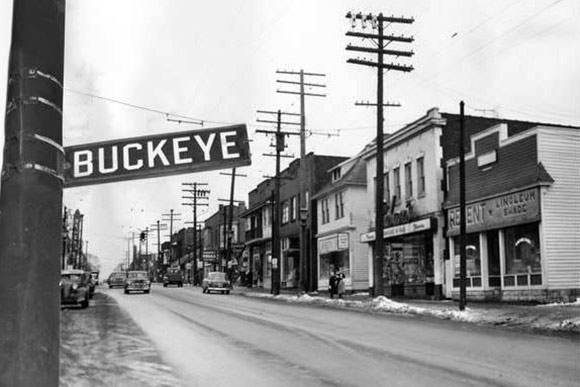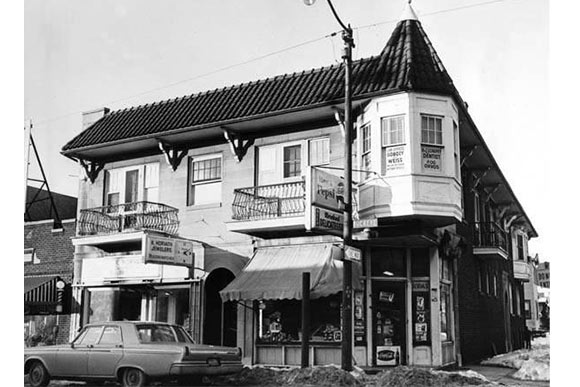Program aims to capture history in Buckeye-Shaker, build community
Most of Cleveland’s neighborhoods were established in the late 1800s by a wave of Eastern Europeans coming to the region looking for manufacturing work. A predominantly-Slovenian population was drawn to labor opportunities in Collinwood, while Hungarians flocked to Buckeye-Shaker.
Over the years, those concentrations dispersed into the suburbs and today both neighborhoods are quite diverse. But that diversity can sometimes come with a loss of community connection, says Cindy Washabaugh, a poet and therapeutic arts practitioner.
So In 2015, Washabaugh had an idea for bringing Cleveland communities together through writing. She went to Collinwood and began Who We Are, Where We Live, a place-based community writing program.
“I really wanted to do a project with writing in a community where people would have a chance to connect with people they wouldn’t necessarily meet,” she says. “Everyone has memories of doing different things in the community. I thought, what if I could go in and do workshops with every facet of the community.”

The success of the Collinwood project resulted in a printed anthology that compiled the participants’ thoughts, memories and perceptions of their community. “The idea was to bring these folks together and really sharing their memories and what their hopes were for the community,” she explains. “It provided a sense of witness, a sense of understanding and trust in their neighbors.”
Today Washabaugh aims to extend the momentum through a partnership with Literary Cleveland, a non-profit organization committed to building a community of readers and writers in Northeast Ohio, to launch Buckeye-Shaker: Who We Are Where We Live.
The program will engage people who live and work in the neighborhood to learn about its history by writing and sharing stories about the community’s past, and understanding the experiences of their neighbors.
“Cleveland is filled with untold stories of our neighborhoods and the people who live there,” says Washabaugh.
While many of the Collinwood memories stemmed out of the Slovenian Workmen’s Home, Washabaugh expects similar memories to come out of St. Elizabeth of Hungary Catholic Church on Buckeye, believed to be the first Hungarian catholic church built in the United States in the late 1800s.
The writing workshops will allow participants to write their stories down and share them — this time on a website anthology — in hopes of remembering Buckeye’s past and preserving its history for future generations.
The Ohio Humanities Council is sponsoring the Buckeye-Shaker project, and Washabaugh has recruited Mark Souther, history professor and director of the Center for Public History and Digital Humanities at Cleveland State University, and Michael Fleenor, director of preservation services at the Cleveland Restoration Society.
“The Ohio Humanities Council challenged us to bring in historians, so we found two,” says Washabaugh, who says Fleenor and Souther will talk about the architecture, how the neighborhood has been represented, how to research your own home’s history, even if you no longer live in the neighborhood, and what makes a neighbor.
“It’s really exciting stuff,” says Washabaugh. “It allows everyone to appreciate each other, at least for a little while.”
Washabaugh encourages participants to write, give oral histories or even contribute a sketch to the anthology. “Writing is a focus that lets you leave something behind or have something to share,” she explains.
Literary Cleveland will host the launch party on Saturday, Apr. 22 from 1 to 3 p.m. at Loganberry Books, 13015 Larchmere Blvd. Souther will speak at the event, which will also have program information and writing activities.
The community writing workshops will be held Saturday, Apr. 29 from 12 to 2 p.m. and Saturday, May 13 from 2 to 4 p.m., both at the Cleveland Public Library’s Rice Branch, 11535 Shaker Blvd. The last workshop will be held Wednesday, May 17 from 1 to 3 p.m. at East End Neighborhood House, 2749 Woodhill Road. Fleenor will speak at the first workshop.
The project will culminate with a reading and celebration on Saturday, July 8 from 1 to 3 p.m. at Loganberry Books.
The launch party and readings are free and open to the public, while the workshops are reserved only for people who live or work in the Buckeye-Shaker neighborhood.



